What is sleep talking?
Sleep talking, formally known as somniloquy, is a common type of parasomnia [1] (a sub-category of sleep disorders referring to abnormal behaviours during sleep).
It involves anything from mumbling to whispers to eloquent speeches, and sometimes the content can be quite graphic or even offensive, though sleep-talking episodes typically last no longer than 30 seconds.
Further down, we look at what causes sleep talking and how you can manage it more effectively, but first, let’s look at some of the most common types of sleep talking.
What are the most common symptoms of sleep talking?
The primary symptom of sleep talking, of course, is audible speech or mumbling that occurs during sleep without the sleeper’s awareness.🗣️
There are a few types of sleep talking:
- Incomprehensible: About half of sleep talking is incoherent [4] and contains low-volume mumbling, shouting, whispers, or laughing.
- Comprehensible: The other half of sleep talking resembles normal conversation and can involve more than one-sided dialogue. Sometimes, comprehensible speech contains negative or emotional content.
Sleep talking episodes are generally short, sometimes just a few words or sentences, and the individual usually has no memory of them upon waking.
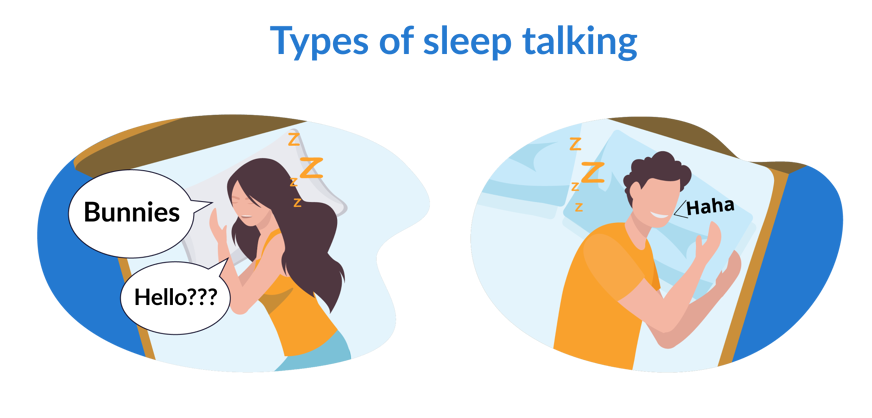
Typically, people only learn about their own sleep talking when others notice and mention it.
Sleep talking doesn’t occur exclusively during dreaming [5] and can happen at any sleep stage, but it is still unknown whether or not it has direct connection to recent life events or experiences.
How common is sleep talking?
Sleep talking is one of the most common parasomnias, with studies showing that up to 66.8% [6] of people have experienced it at some point in their lives.
However, frequent occurrences are less common, and even habitual sleep talkers don’t exhibit the behaviour every night.
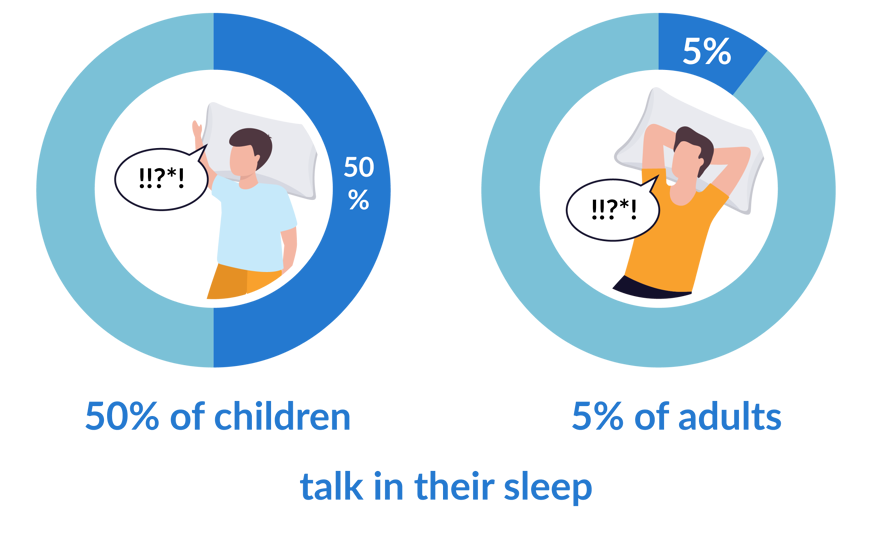
Overall, sleep talking is also more prevalent in children than in adults, with about half of all children under 10 exhibiting signs, compared to only about 5% of adults [7].
Is sleep talking dangerous?
Like some other involuntary sleep behaviours like drooling, sleep talking itself is not considered a medical issue and is generally harmless.
It also doesn’t usually affect the quality of sleep for the person who experiences it, though it can disrupt the sleep of others sharing the room.
- If sleep talking is loud or frequent, it might disturb the sleep of a bed partner or roommate, potentially leading to insomnia or excessive daytime sleepiness for them.
- If the content of the sleep talking is embarrassing or sensitive, it could cause awkwardness or stress in the relationship between the sleep talker and their bed partner or roommate.
These are usually the prime reasons people will ask themselves why they talk in their sleep and how to treat sleep talking, which we’ll look at in more detail further down.
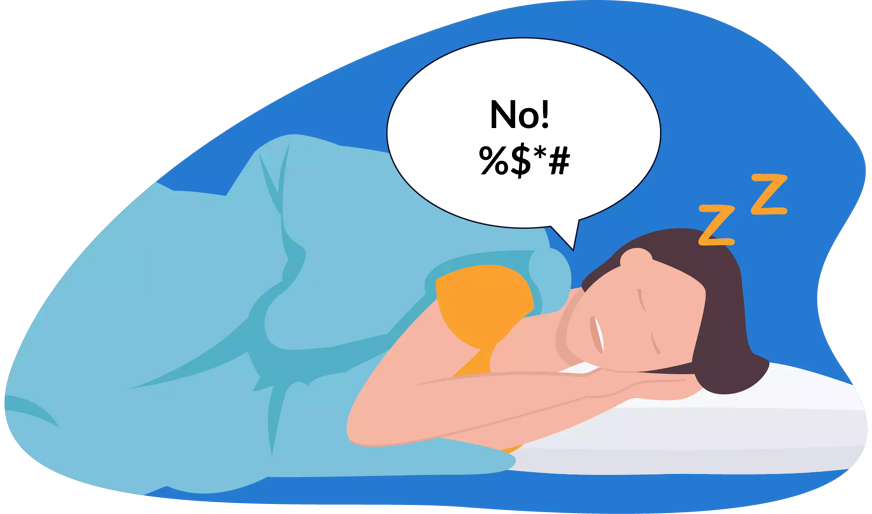
Although usually harmless and occurring independently, it is worth keeping in mind that sleep talking can sometimes indicate a more serious sleep disorder or condition.
For instance, it may accompany RBD [8], where individuals act out their dreams, sleep terrors [9], which involve frightening screams and physical movements, sleep-related eating disorder [10] (SRED), or sleepwalking.
If your sleep talking occurs in conjunction with other parasomnia and occurs suddenly as an adult, it may indicate a more severe sleeping disorder or health condition, and medical guidance is advised.
What causes sleep talking in adults?
Experts are still uncertain about the exact causes of sleep talking - much of sleep [11], in fact, isn’t well understood - though there is some consensus that it’s not just related to dreaming and may have a more neurological base.
According to Dr Milena Pavlova [12], a neurologist at Mass General Brigham [13], sleep talking can be attributed to the fact that parts of your brain haven’t transitioned to sleep mode even though you’re already asleep.
There may be a genetic factor [14] at play as some research indicates that somniloquy runs in families.
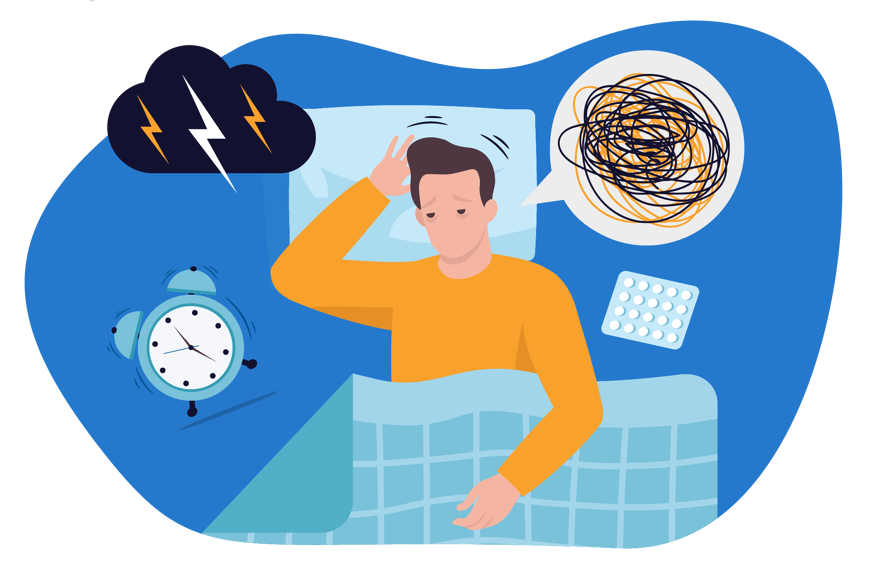
Mental health conditions [15], particularly stress, depression, and post-traumatic stress disorder (PTSD) also seem to play a role, especially if the onset of sleep talking begins after the age of 25 [16] - but it does not seem to be associated with mental illness.
Behavioural sleep medicine specialist Dr Michelle Drerup [17] at the Cleveland Clinic also explains that parasomnia, in general, occur more frequently when sleep patterns are disrupted [18], suggesting that anything that can disturb your sleep can also contribute to sleep talking.
This includes sleep deprivation, substance abuse, sleep apnoea, stress, anxiety, and even jet lag.
How to stop talking in your sleep
Since the exact cause of sleep talking is not yet fully understood, there are no proven methods to completely stop it from occurring.

However, since sleep talking may be exacerbated by lifestyle choices or external influences that lead to disrupted sleep or sleep deprivation, this is one area sleep talkers can work on.
Here are a few suggestions:
- Keep a sleep diary: To begin with, keeping a sleep diary can help in understanding sleep patterns and identifying potential triggers, such as increased stress, alcohol consumption, etc. You may need to rely on a partner to assist here in noting down increased sleep talking episodes.
- Cutting out alcohol, drugs, or certain medications: These substances can affect the nervous system and are believed to increase the frequency of sleep talking.
- Sticking to a regular sleep schedule: Shift work or irregular sleeping patterns disrupt the natural circadian rhythm, making sleep disturbance and sleep talking more likely.
- Following a healthy diet: Certain foods and stimulants, especially close to bedtime, can negatively impact sleep quality and may lead to more frequent sleep talking episodes.
- Upping your sleep routine: Optimising your sleep hygiene routine and bedroom environment, which includes elements like limiting screen time before bed and incorporating relaxing pre-bed rituals, can help you sleep better and decrease the likelihood of sleep talking.
- Cognitive Behavioural Therapy (CBT): For individuals struggling with PTSD or severe stress and anxiety, consulting a CBT or CBT-I therapist may be helpful.
For individuals experiencing frequent or problematic sleep talking, especially if it starts suddenly in adulthood or involves intense or fearful expressions, consulting a sleep specialist is recommended. 👨⚕️
In such cases, sleep talking may be a symptom of an underlying condition.
How can bed partners of sleep talkers get better sleep?
Sleep talkers are rarely negatively affected by their nighttime conversations, unless, of course, it’s accompanied by other sleep disorders that lead to long-term sleep deprivation.
But bed partners and roommates often experience the most inconvenience from sleep talking, being woken up or kept awake by their partner’s speech.
By following some of the sleep hygiene practices mentioned above, the sleep talker may be able to limit the frequency of sleep talking.
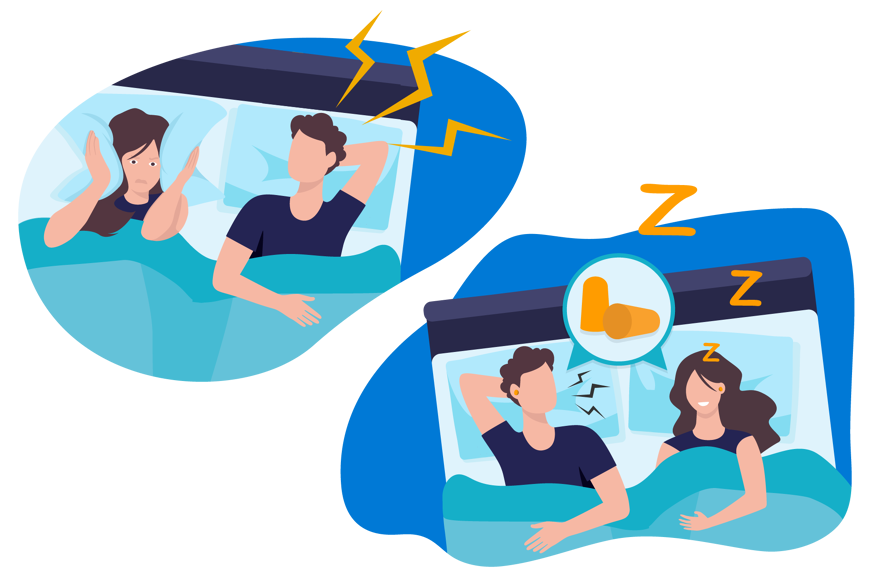
Additionally, measures such as wearing earplugs or headphones, using a white noise machine or fan to mask the sounds, and even sleeping in separate rooms can alleviate the disruption caused by sleep talking.
Should you be concerned about your sleep talking?
As our guide has hopefully shown, sleep talking is a common phenomenon that shouldn’t be a reason for concern.
Improving sleep hygiene, decreasing stress, and engaging in better lifestyle choices can help manage sleep talking and decrease the severity thereof.
However, we’d recommend seeing a sleep specialist or healthcare professional if you have any other causes for concern, and especially if your sleep talking is accompanied by other sleep disorders and you’re frequently feeling sleep deprived.
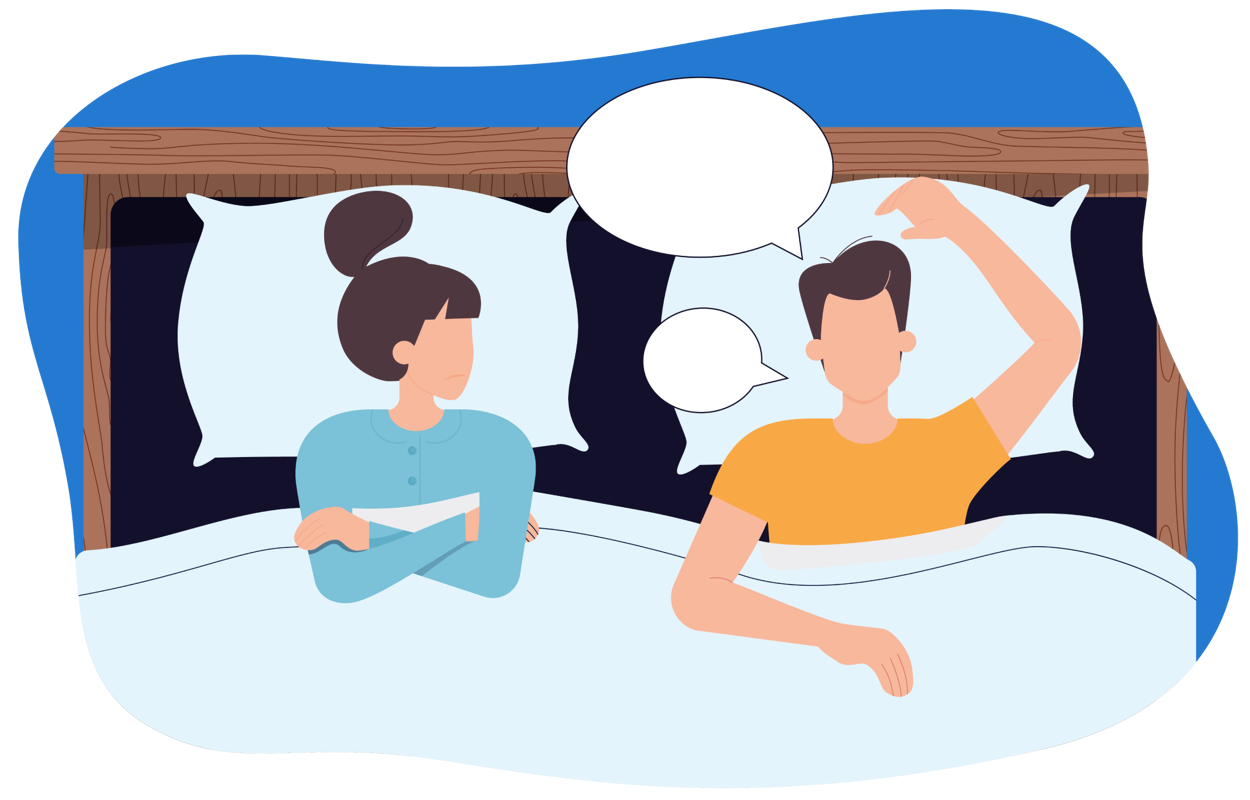





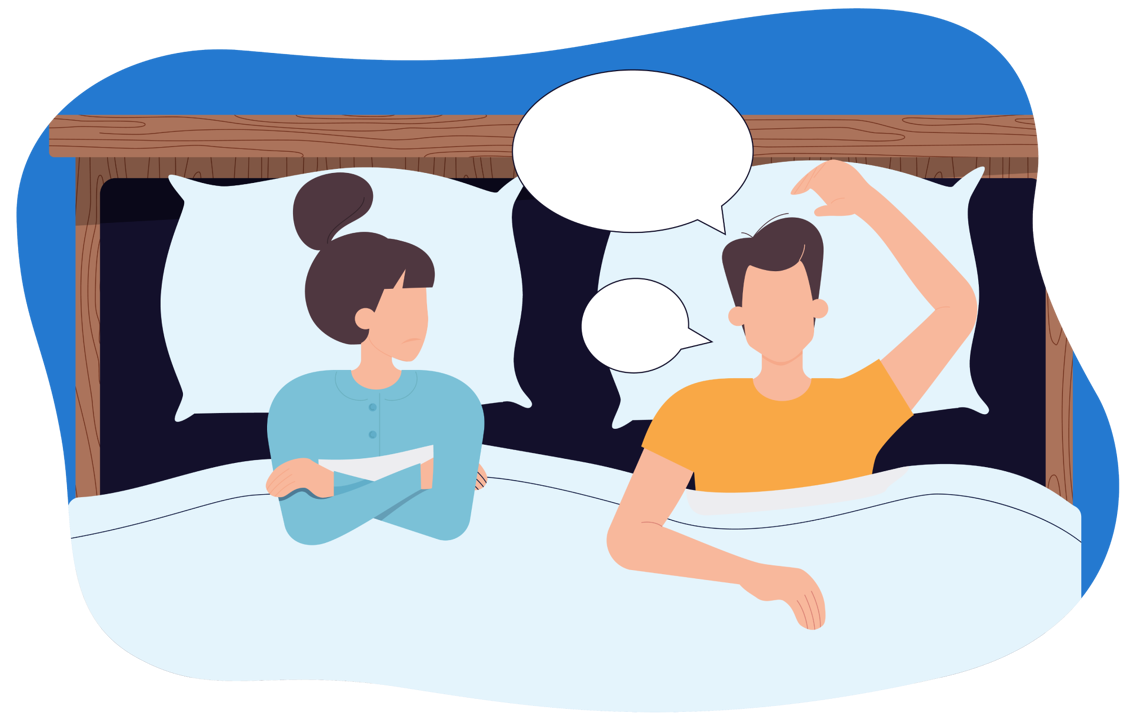
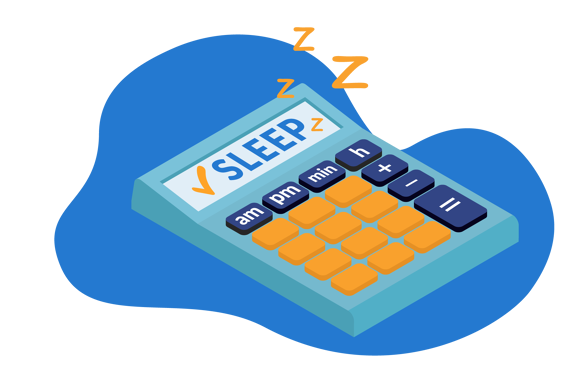




Alternatively, message us directly via the Contact Us page.